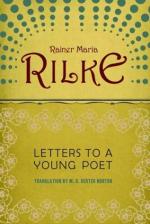
|
| Name: _________________________ | Period: ___________________ |
This test consists of 5 multiple choice questions, 5 short answer questions, and 10 short essay questions.
Multiple Choice Questions
1. From where is Rilke's sixth letter written?
(a) Rome, Italy.
(b) Paris, France.
(c) Florence, Italy.
(d) Bremen, Germany.
2. In letter seven, what does Rilke say that love should be?
(a) A union of one with another.
(b) A balance of mental and physical.
(c) A selfless act.
(d) A motivation for each person to become wholly him or herself.
3. What does Rilke advise the young poet to do if he cannot connect with people?
(a) Develop his sense of empathy.
(b) Identify with nature, animals, and children.
(c) Learn an instrument.
(d) Read more books.
4. What type of sadness does Rilke call "dangerous"?
(a) Sadnesses that are caused by feelings of inferiority.
(b) Sadnesses that are caused by love.
(c) Sadnesses that one suppresses rather than lives.
(d) Sadnesses that are caused by helplessness.
5. What is the primary topic of the eighth letter?
(a) Nature.
(b) Creativity.
(c) Sadness.
(d) Solitude.
Short Answer Questions
1. What does Rilke say is wrong with the way most people approach love?
2. In what year is Rilke writing the eighth letter?
3. In what year is Rilke's sixth letter written?
4. To what does Rilke compare the realization about the true nature of human existence in letter eight?
5. According to Rilke in letter eight, where does destiny originate?
Short Essay Questions
1. What is Rilke's definition of love?
2. Rilke comments on the young poet's profession and compares the young poet's profession to other professions. What is Rilke's general idea about professions?
3. How does Rilke respond to the young poet's expression of fear that the young poet has lost God?
4. What does Rilke say about the amount of beauty in Rome?
5. What can be inferred about the young poet's feelings toward his own solitude from Rilke's seventh letter?
6. Rilke implies that security and comfort are negative. Why?
7. In letter five, Rilke comments on Rome and says that the first few days one is in Rome have "an oppressively sad effect" because everything in Rome is old and looking backward toward the past. How does this sentiment reflect Rilke's life philosophies as he has expressed them thus far in the book?
8. What does Rilke mean when he says that humans have no choice in deciding to be solitary?
9. Why does Rilke advise the young poet "to be lonely and attentive when one is sad" in letter eight?
10. What can be inferred about the mental and emotional state of the young poet from Rilke's reply in letter six?
|
This section contains 920 words (approx. 4 pages at 300 words per page) |

|




